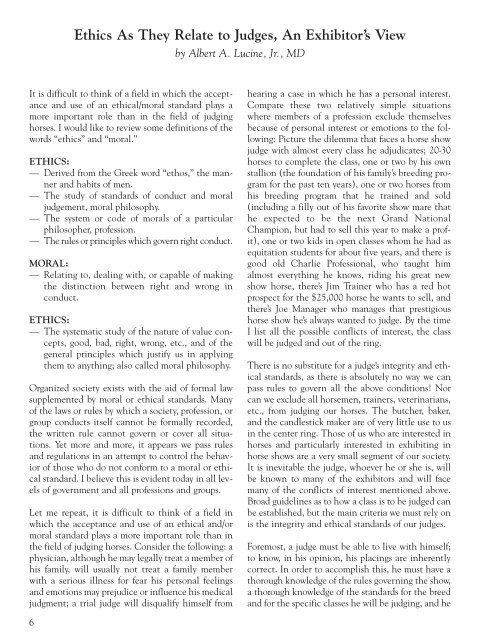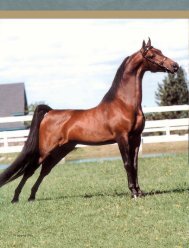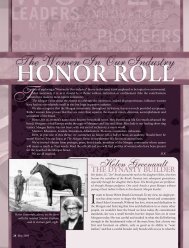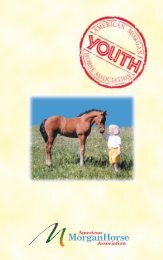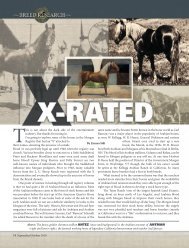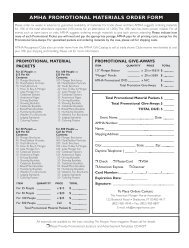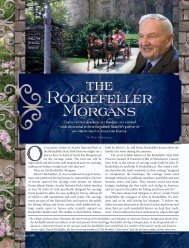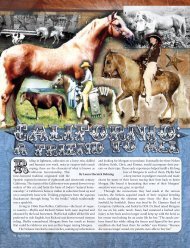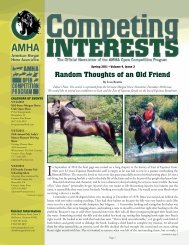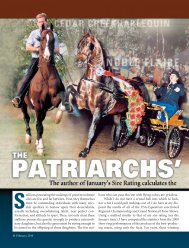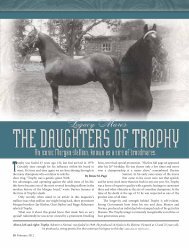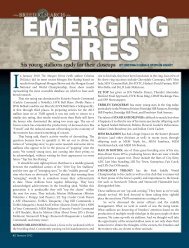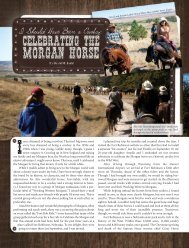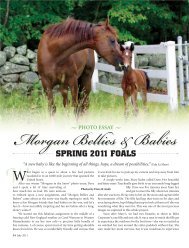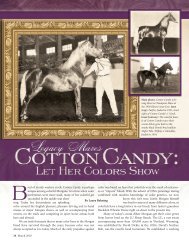Ethics As They Relate to Judges, An Exhibitor’s Viewby Albert A. Lucine, Jr., MDIt is difficult to think of a field in which the acceptanceand use of an ethical/moral standard plays amore important role than in the field of judginghorses. I would like to review some definitions of thewords “ethics” and “moral.”ETHICS:— Derived from the Greek word “ethos,” the mannerand habits of men.— The study of standards of conduct and moraljudgement, moral philosophy.— The system or code of morals of a particularphilosopher, profession.— The rules or principles which govern right conduct.MORAL:— Relating to, dealing with, or capable of makingthe distinction between right and wrong inconduct.ETHICS:— The systematic study of the nature of value concepts,good, bad, right, wrong, etc., and of thegeneral principles which justify us in applyingthem to anything; also called moral philosophy.Organized society exists with the aid of formal lawsupplemented by moral or ethical standards. Manyof the laws or rules by which a society, profession, orgroup conducts itself cannot be formally recorded,the written rule cannot govern or cover all situations.Yet more and more, it appears we pass rulesand regulations in an attempt to control the behaviorof those who do not conform to a moral or ethicalstandard. I believe this is evident today in all levelsof government and all professions and groups.Let me repeat, it is difficult to think of a field inwhich the acceptance and use of an ethical and/ormoral standard plays a more important role than inthe field of judging horses. Consider the following: aphysician, although he may legally treat a member ofhis family, will usually not treat a family memberwith a serious illness for fear his personal feelingsand emotions may prejudice or influence his medicaljudgment; a trial judge will disqualify himself fromhearing a case in which he has a personal interest.Compare these two relatively simple situationswhere members of a profession exclude themselvesbecause of personal interest or emotions to the following:Picture the dilemma that faces a horse showjudge with almost every class he adjudicates; 20-30horses to complete the class, one or two by his ownstallion (the foundation of his family’s breeding programfor the past ten years), one or two horses fromhis breeding program that he trained and sold(including a filly out of his favorite show mare thathe expected to be the next Grand NationalChampion, but had to sell this year to make a profit),one or two kids in open classes whom he had asequitation students for about five years, and there isgood old Charlie Professional, who taught himalmost everything he knows, riding his great newshow horse, there’s Jim Trainer who has a red hotprospect for the $25,000 horse he wants to sell, andthere’s Joe Manager who manages that prestigioushorse show he’s always wanted to judge. By the timeI list all the possible conflicts of interest, the classwill be judged and out of the ring.There is no substitute for a judge’s integrity and ethicalstandards, as there is absolutely no way we canpass rules to govern all the above conditions! Norcan we exclude all horsemen, trainers, veterinarians,etc., from judging our horses. The butcher, baker,and the candlestick maker are of very little use to usin the center ring. Those of us who are interested inhorses and particularly interested in exhibiting inhorse shows are a very small segment of our society.It is inevitable the judge, whoever he or she is, willbe known to many of the exhibitors and will facemany of the conflicts of interest mentioned above.Broad guidelines as to how a class is to be judged canbe established, but the main criteria we must rely onis the integrity and ethical standards of our judges.Foremost, a judge must be able to live with himself;to know, in his opinion, his placings are inherentlycorrect. In order to accomplish this, he must have athorough knowledge of the rules governing the show,a thorough knowledge of the standards for the breedand for the specific classes he will be judging, and he6
must be consistent in his placings and decisions.Without these qualities, he cannot approach judgingthe class outlined above with confidence, nor can heturn in his card and be able to live with himself. Hisfailure to possess these qualities will soon becomeevident to exhibitor and show management alike.Consistency in your placings will, in my opinion,quickly point out your integrity and your degree ofknowledge of the standards.If one is to judge one of the highly competitive threeor four-day <strong>Morgan</strong> shows with classes of twenty toforty entries, a clear mental image of the standardfor each type of class is of primary importance. Anyjudge only recently exposed to <strong>Morgan</strong>s would dowell to observe one or two of our larger shows beforeattempting to judge one of these shows, unless he isunusually qualified or experienced. Too often, aninexperienced judge can “get lost” at our largershows if he or she has only been exposed to showswith two or three <strong>Morgan</strong> classes a day, and aboutfour to eight entries in each class. By going over hishead and accepting an invitation to judge a show forwhich he is not sufficiently experienced, a judge willonly serve to confuse himself and distort the mentalimage he must rely upon. I believe this will cause theinexperienced judge to compromise his own standards.If this mental image is distorted, might thejudge not attempt to solve his dilemma by looking atriders, not horses, for example? A judge can bestserve him or herself and the horse world by adequatelypreparing himself for each step he takesalong the way to judging the Grand National<strong>Morgan</strong> Show.One cannot forget your acceptance as a “goodjudge” is dependent not only upon the horses youpin, but also upon the manner in which you conductyourself both inside and outside the ring. Inthe ring, each judge must develop for himself a systemof recall that works for him. This can be amental or some type of visual marking system. Thissystem must give you sufficient information toenable you to compare your mental image of theideal <strong>Morgan</strong> to the horses in the ring and properlypin the class. It must be foolproof, nothing canbe worse than to leave your winner in the center ofthe ring during a workoff and then lose him whenyou place the class. The manner in which youobserve each horse performing in the ring will domore than anything else to demonstrate to eachexhibitor that “he’s getting a fair shake.” If theexhibitor feels you have not looked at his horse,there is no way you can convince him that you gavehim a fair shake; and actually, that is all theexhibitor is really asking! Remember, as youapproach each horse, as you are marking yourjudge’s card, as you are apparently staring at theringmaster; the eyes of all exhibitors and spectatorsare upon you, judging whether you know what youare doing and whether you care.As mentioned, the <strong>Morgan</strong> show world is a verysmall world indeed. While on the show grounds,you are certainly going to meet friends and associatesof long standing who are also exhibitors.Certainly your greeting to them should be warmand friendly, but please do not enter into long conversationsin public. I am not aware of any judge’saction more open to criticism than carrying on alengthy conversation with an exhibitor. Remember,there are more losers than winners, and they allassume you are talking about that exhibitor’s horses,even though you know you were talking about politicsor the weather. In some USEF divisions, Iunderstand judges are invited and expected toattend exhibitor parties; at the present time, Ibelieve it is the opinion of most exhibitors that youshould not attend such functions. Possibly youmight attend an unusual function or celebration ofthe show committee. During the show, any discussionyou might have with an exhibitor regardingyour placing of his horse must be carried out withthe permission of the show steward and must bebrief; again, a prolonged conversation lends itself tocriticism even though there may be no basis for suchcriticism. Do not forget that regardless of how goodyour placings are in the ring, whether or not you areaccepted by many exhibitors will also depend onyour conduct outside the ring.Exhibiting horses is a very emotional undertakingfor the individuals and often the family involved. Weall know of families who are proud of their worktogether, and particularly proud of the manner inwhich their child or children have responded to themany challenges they face in getting a horse into thering. Whether this becomes a pleasant and rewardingexperience contrasted to an unhappy, bitterexperience may be directly related to the degree ofcompetence, excellence, and integrity you possess asa judge.7


